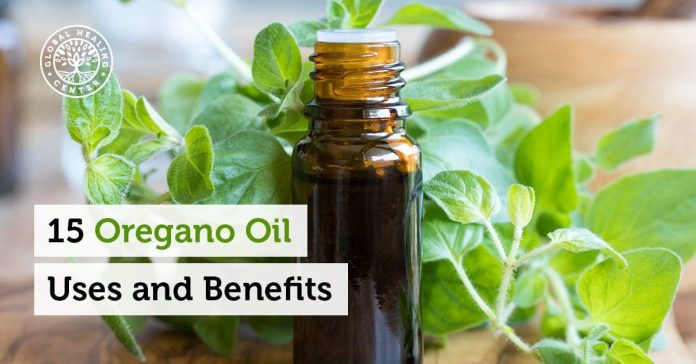Without a doubt, oregano oil is one of the best natural supplements you can get. It’s produced from the perennial herb oregano and loaded with free-radical-crushing antioxidants. A growing body of research has shown that oregano oil offers many positive health benefits and is one of the most potent natural remedies in existence.[1] In particular, there has been a significant evaluation of its effects against harmful organisms; investigations even been made by major pharmaceutical companies. Let’s take a look at why there’s so much interest in oregano oil and its 15 best uses.
What Are the Top 15 Uses for Oregano Oil?
- Immune System Support
- Protection Against Harmful Organisms
- Promotes a Balanced Mood
- Digestive Aid
- Supports Graceful Aging
- Allergy Support
- Weight Loss
- Eases Discomfort
- May Help You Feel Better When You Have a Cold
- Calms Lip Blemishes
- Helps with Food Preservation
- Promotes Intestinal Balance
- Encourages Normal Yeast Balance
- Supports Liver Health
- Acts As a Powerful Antioxidant
1. Immune System Support
Oregano oil is a powerful tool for the immune system, especially when it encounters outside invaders. It has such a strong action against germs that it could easily defeat Salmonella.[2]
Researchers at Georgetown University Medical Center said, “New, safe agents are needed to…overcome harmful organisms… Based on our previous experience and that of others, we postulated that herbal essential oils, such as those of Origanum (oregano oil)…offer such possibilities.”[3]
2. Protection Against Harmful Organisms
If you’ve consumed impure water, or other risky actions, harmful organisms are likely to reside inside of your body. Thankfully, oregano oil is shown to be extremely useful for getting rid of these unwanted invaders. It’s been shown that taking 600 mg of oregano oil daily can prompt harmful organisms to disappear from stool.[4]
3. Promotes a Balanced Mood
Some compounds in oregano oil, including carvacrol, thymol, and terpinene may positively influence the nervous system and mind. Aromatherapy with oregano oil seems to promote a healthy mood, reduce stress, and inhibit emotional abnormalities.[1]
4. Digestive Aid
I’ve said it a million times — health begins in the gut! Good digestion is absolutely necessary to experience good health. While I recommend using an oxygen-based colon cleanser to clean out your digestive tract, stopping the build-up in the first place needs to be part of the plan, and oregano oil can help.[5] Oregano oil is known to stimulate the flow of bile into the digestive organs, enhancing the digestive process.[6]
5. Supports Graceful Aging
Perhaps the hottest health trend of the past few years is the science of combating aging. It’s important to understand that aging is largely affected by oxidation and free radicals, which is why antioxidants are so effective. Oregano oil offers a huge amount of antioxidants that can aid in the defense against these free radical aging-accelerators.[7, 8]
6. Allergy Support
If you suffer from allergies and environmental sensitivities, the soothing properties of oregano oil are appealing. Oregano oil — and particularly the carvacrol, rosmarinic acid, and thymol oils it contains — can produce a soothing effect on redness and swelling associated with allergies, which ultimately encourages relief.[1] For those wishing to avoid harsh medications, oregano oil may be a natural alternative for curtailing the undesirable effects associated with environmental sensitivities.
7. Weight Loss
In addition to its reputation as a natural immune booster, oregano oil also packs a punch against unwanted body fat. Its main active ingredient, carvacrol, is thought to modulate genes and reduce irritation in white adipose tissue. Carvacrol can help reduce weight, and even lower levels of cholesterol and triglycerides.[9]
8. Eases Discomfort
Aches and stiffness can wreak havoc and negatively impact your quality of life. Topical application of oregano oil has shown it has analgesic or pain-relieving properties.[10, 11] I use oil of oregano topically and feel like it goes deep inside my skin to relieve sore joints and muscle discomfort.[6] Simply add a drop of organic oregano oil to a carrier oil, like organic olive oil and apply topically to the affected area for relief. If you suffer from sore muscles, sports injuries, and backaches, this is one benefit you’ll appreciate.
9. May Help You Feel Better When You Have a Cold
Oregano oil isn’t a cure for the cold, but it can help you feel better. It may reduce the discomfort of your symptoms.[10] The essential oil can help promote easy breathing, calm a cough, and soothe a sore throat, especially when used in combination with other essential oils like eucalyptus, rosemary, and mint.[1] When I start to feel under the weather, I place three to six drops into an empty capsule and take two to three times daily before meals. A 5 to 10-day regimen can work wonders.
10. Calms Lip Blemishes
Many people apply oregano oil to lip blemishes with the belief it will help soothe the area and accelerate healing time. Carvacrol may promote resistance against the harmful organisms that cause lip blemishes.[12]
11. Helps With Food Preservation
Spices and herbs, like oregano, have a long history of food preservation and safety. Many types of food are a haven for harmful bacteria. As mentioned, oregano oil may help resist harmful organisms. Essential oils, including oregano, may have the power to halt the spread of organisms in spoiled fruit juice and other foods. [13, 14]
12. Promotes Intestinal Balance
Maintaining a proper balance of healthy bacteria in your intestines and gut is crucial for supporting good health. A healthy colony of intestinal flora encourages proper digestion and boosts the immune system. Good bacteria also support the immune system and help balance mood. Carvacrol may help promote gut health by creating an appropriate balance of good bacteria and bad bacteria.[15]
13. Encourages Normal Yeast Balance
Yeast and fungus exist everywhere, even on and in the human body; total eradication is next to impossible. Balance, however, is both desirable and achievable with the help of carvacrol. It’s a very effective essential oil that addresses and reduces fungus.[16] Likewise, oregano oil is helpful for promoting balanced Candida, a fungus that commonly falls out of balance from poor diet, stress, or antibiotics.[17]
14. Supports Liver Health
Toxins exist in our water, food, and even the air we breathe. The ever-present barrage of toxins in our environment is extraordinary, and the burden it places on the liver is equally mind-boggling. Carvacrol may support the normal function of the liver, the body’s primary detoxifying organ.[18]
15. Acts As a Powerful Antioxidant
Oregano oil has many powerful antioxidants — molecules that counteract the free radical damage that oxidizes cells, leading to aging and disease. Oregano’s constituent phytochemicals, including carvacrol, rosmarinic acid, thymol, and others, are antioxidant molecules.[1, 17] These antioxidants are the reason why oregano oil has been shown to help so many different aspects of health, including heart health, nervous system health, and systemic redness and swelling throughout the body.[1]
Points to Remember
Oregano oil is an absolute must-have item for any medicine cabinet or emergency kit. The array of benefits it offers makes it one of the best all-around supplements you can get. Remember, as with any health product, quality matters tremendously.
Oregano Oil Liquid Capsules, Global Healing’s oregano oil blend is organic, has an extra virgin olive oil base, and at least 80 percent carvacrol. It’s also blended with peppermint oil and capsaicin (the compound that gives peppers their heat) for added resistance to harmful organisms.[19, 20] It’s easy to get started with an organic oregano oil blend like ours. Take two capsules twice daily or as recommended by your physician.
References (20)
- Singletary, Keith. “Oregano.” Nutrition Today, vol. 45, no. 3, May 2010, pp. 129–138.
- Moore-Neibel, K, et al. “Antimicrobial Activity of Oregano Oil Against Antibiotic-Resistant Salmonella Enterica on Organic Leafy Greens at Varying Exposure Times and Storage Temperatures.” Food Microbiology., vol. 34, no. 1, 19 Mar. 2013, pp. 123–9. Accessed 1 Mar. 2017.
- Preuss, HG, et al. “Minimum Inhibitory Concentrations of Herbal Essential Oils and Monolaurin for Gram-Positive and Gram-Negative Bacteria.” Molecular and Cellular Biochemistry., vol. 272, 14 July 2005, pp. 29–34. Accessed 1 Mar. 2017.
- Force, Mark, et al. “Inhibition of Enteric Parasites by Emulsified Oil of Oregano in Vivo.” Phytotherapy Research, vol. 14, no. 3, May 2000, pp. 213–214.
- Zou Y, et al. “Oregano Essential Oil Improves Intestinal Morphology and Expression of Tight Junction Proteins Associated with Modulation of Selected Intestinal Bacteria and Immune Status in a Pig Model.” Biomed Res Int. 2016; 2016: 5436738.
- “Oregano.” MedlinePlus, U.S. National Library of Medicine, 13 June 2016, Accessed 1 Mar. 2017.
- Bozin, B, et al. “Characterization of the Volatile Composition of Essential Oils of Some Lamiaceae Spices and the Antimicrobial and Antioxidant Activities of the Entire Oils.” Journal of Agricultural and Food Chemistry., vol. 54, no. 5, 2 Mar. 2006, pp. 1822–8. Accessed 1 Mar. 2017.
- Sharifi-Rad M, et al. “Carvacrol and human health: A comprehensive review.” Phytother Res. 2018 Sep;32(9):1675-1687.
- Cho, Soomin, et al. “Carvacrol Prevents Diet-Induced Obesity by Modulating Gene Expressions Involved in Adipogenesis and Inflammation in Mice Fed with High-Fat Diet.” The Journal of Nutritional Biochemistry, vol. 23, no. 2, 1 Feb. 2012, pp. 192–201. Accessed 1 Mar. 2017.
- Han X, Parker TL. “Anti-inflammatory, tissue remodeling, immunomodulatory, and anticancer activities of oregano (Origanum vulgare) essential oil in a human skin disease model.” Biochim Open. 2017 Jun; 4: 73-77.
- de Cássia da Silveira e Sá, R, et al. “Analgesic-like activity of essential oil constituents: an update.” Int J Mol Sci. 2017 Dec;18(12):2392.
- Lai L, et al. “Inhibition of herpes simplex virus type 1 by thymol-related monoterpenoids.” Planta Medica. October 2012.
- Helal A, et al. “Antimicrobial Activity of Some Essential Oils Against Microorganisms Deteriorating Fruit Juices.” Mycobiology. 2006;34(4):219-229.
- Cenci AM, Ugalde ML, Steffens J, Valduga E, Cansian RL, Toniazzo G. “Control of Penicillium sp. on the Surface of Italian Salami Using Essential Oils.” Food Technology and Biotechnology. 2015;53(3):342-347.
- Michiels J, et al. “Effects of dose and formulation of carvacrol and thymol on bacteria and some functional traits of the gut in piglets after weaning.” Archives of Animal Nutrition. April 2010.
- Zabka M, et al. “Antifungal efficacy of some natural phenolic compounds against significant pathogenic and toxinogenic filamentous fungi.” Chemosphere. June 2013.
- Azimi H, et al. “A comprehensive review of vaginitis phytotherapy. Pakistan Journal of Biological Sciences.” November 2011. PMID: 22514885.
- Nafees S, et al. “Carvacrol ameliorates thioacetamide-induced hepatotoxicity by abrogation of oxidative stress, inflammation, and apoptosis in liver of Wistar rats. Human and Experimental Toxocology.” August 2013. PMID: 23925945.
- Pattnaik, S, et al. “Antibacterial and Antifungal Activity of Ten Essential Oils in Vitro.” Microbios., vol. 86, no. 349, 1 Jan. 1996, pp. 237-46. Accessed 1 Mar. 2017.
- Omolo, Morrine A, et al. “Antimicrobial Properties of Chili Peppers.” Journal of Infectious Diseases and Therapy, vol. 02, no. 04, 2014. Accessed 27 Feb. 2017.
†Results may vary. Information and statements made are for education purposes and are not intended to replace the advice of your doctor. If you have a severe medical condition or health concern, see your physician.
Top




